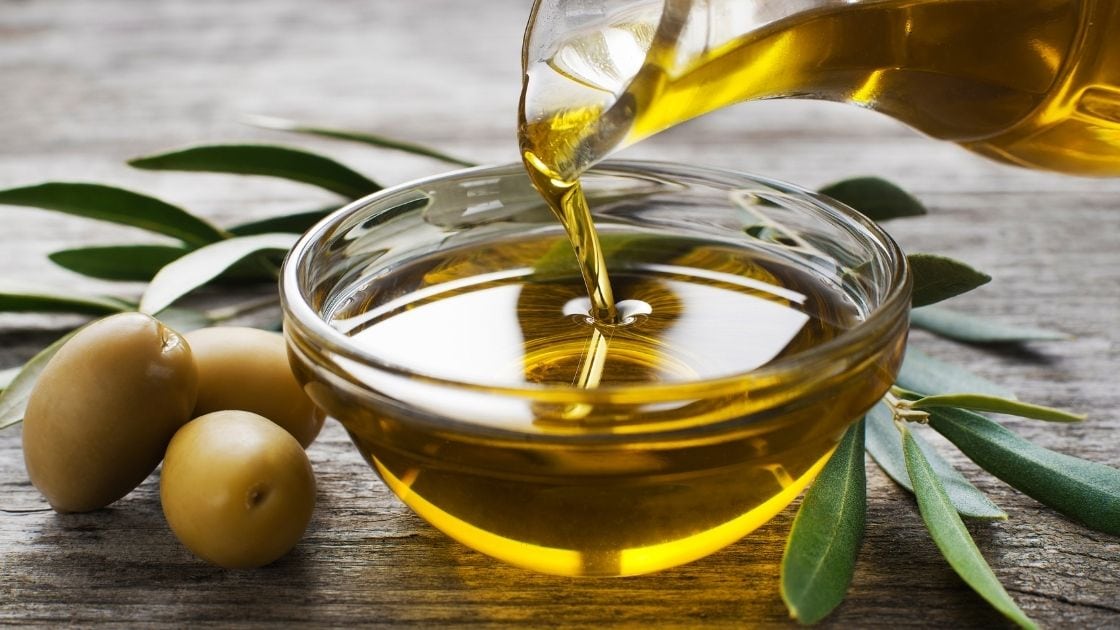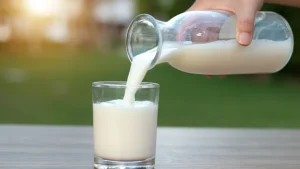- It is an edible vegetable oil that is high in monounsaturated fats and has a nutritional profile
- There are different types of olive oil, including extra virgin, virgin, pure, refined, and pomace oil
- It is a healthier alternative to butter, as it contains less saturated fat and can help prevent heart disease and obesity
- It has numerous health benefits, including promoting heart health, preventing metabolic syndrome and cancer, and many more
- While olive oil should be consumed in moderation due to its high calorie and fat content, incorporating it into a Mediterranean diet can support weight loss
Supposedly gifted to the people of Athens by Athena, the olive and olive oil have held an almost revered position in the homes and kitchens of Greece and neighboring countries for millennia.
And it’s not hard to see why.
The use of this golden liquid extends from cooking to cosmetics.
It’s traditionally been considered an elixir, and recent FDA regulations have christened it as modern medicine.
The health benefits of olive oil are pretty widespread.
From heart health to supple skin, olive oil can help pretty much all areas of the body.
But did you know that you can even use olive oil for weight loss?
You read that right: an oil for weight management!
It sounds pretty incredible, but studies suggest regular olive oil benefits your waist and wellness.
But just how does it work?
And how can you make olive oil for weight loss work for you?
Thankfully, this time, divine intervention isn’t necessary.
Instead, we’ve prepared this quick article covering everything you need.
So what even is olive oil anyway?
What is Olive Oil?
Olive oil is an edible vegetable oil that originated in the Mediterranean basin.
It’s made by pressing the fruit of ripe, whole olives to extract a fragrant, green, or yellowish oil – the creation that has taken over the culinary world as olive oil.
This potent oil has been used since early times; however, the popularity of olive oil has skyrocketed in the last few decades as people have become aware of the dangers of traditional animal fats like butter and lard and the adverse health effects of coconut oil and margarine.
As opposed to the dangerous saturated fats these foods contain, olive oil contains mainly monounsaturated fats – namely oleic acid (55- 80%) and linoleic acid (~10%), considered the most unsaturated fats of any natural oils.
This fat composition has resulted in an impressive nutritional profile. Let’s have a quick look:
Nutritional Profile of Olive Oil
While exact numbers can vary based on the maturity and species of olive used in the pressing, the United States Department of Agriculture (USDA) states that 1 tablespoon (13.5 grams) of olive oil contains:
- 119 calories
- 13.5g fat
- 1.86g saturated fat
- Vitamin E – 1.9mg
- Vitamin K – 8.13mcg
It’s also got high amounts of healthy oleic and linoleic fatty acids, which can even fight back against heart disease and other metabolic concerns.
Types of Olive Oil
If you’ve ever stopped and looked at the bottles of olive oil at your grocery store, you might have noticed more than a few different types of olive oil on offer.
From extra virgin to virgin, fruity to ripe – it’s no wonder you can get ‘extra’ confused when choosing an oil.
These types of olive oil vary in flavor profile and nutrition, but where does the difference come from?
Like winemaking, there are a few different variables at play here.
These are:
- Type of Olive variety used
- Maturity of the fruit
- Extraction process
- Filtration
While the type and maturity of the fruit alter the flavor notes and aroma of the oil, the extraction process makes the real difference.
This is where olive oil is broken down into categories like ‘extra virgin’ and ‘pure.’
Remember, like wine, different olive oils work best with other dishes, so let’s also check out the best types of olive oil depending on what’s on for dinner.
Extra Virgin Olive Oil
This is an extremely refined and minimally treated oil whose quality is maximized by extreme filtration.
The main characteristic distinguishing extra-virgin olive oil from other types is its high oleic acid content (>55%).
It is pale in color and has a delicate aroma.
Extra virgin olive oil works best as a salad dressing and should not be used for cooking.
Virgin Olive Oil
This is an oil that contains less than 2% free monounsaturated fatty acids and has a color ranging from light green to yellowish.
It has notes of fruit and sometimes nutty or earthy undertones in other oils.
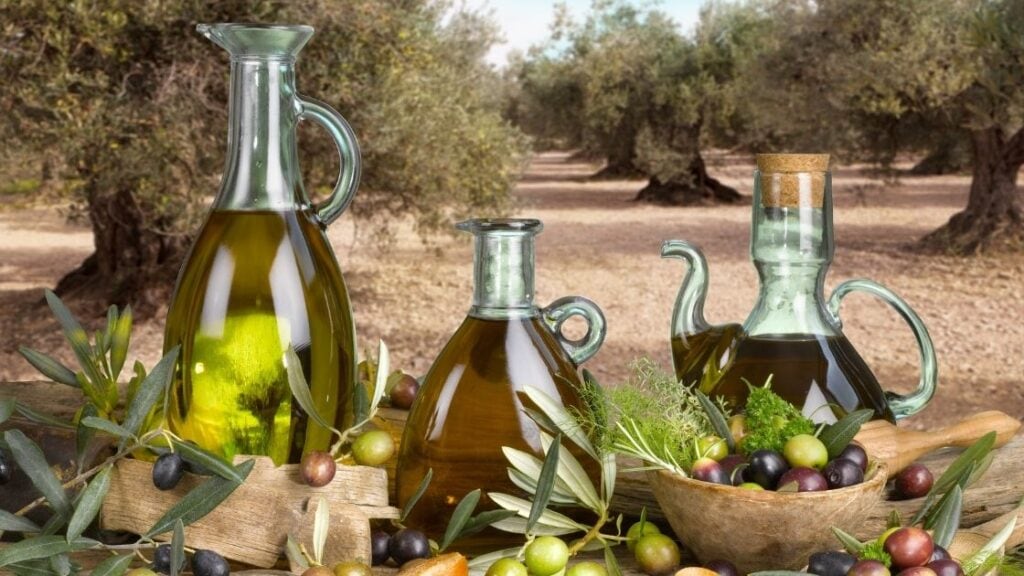
The benefits of extra virgin olive oil come from the production process.
It’s made using the cold-pressed method and without treatment by heat to preserve the delicate balance of heat-sensitive compounds in the oil.
For this reason, virgin olive oil works best for dishes that don’t require heat and is good for healthy weight loss.
Try using it in hummus or other dips as a replacement for butter or margarine on bread or to balance soups.
Pure Olive Oil
Pure or regular olive oil means that heat or chemicals have been used in the extraction process.
For this reason, some of the benefits of virgin olive oil are lost, and its oleic acid content is between 3-4%.
On the other hand, it is a better olive oil for cooking as it’s already been treated with heat.
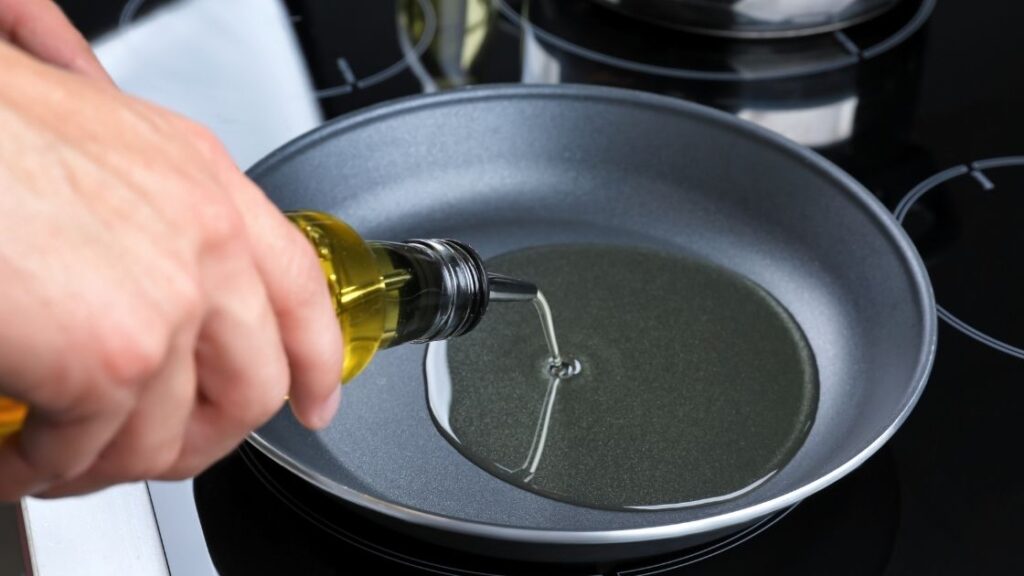
Try regular olive oil for cooking. If you want to cook with olive oil for weight loss, we recommend adding a small amount while sauteing or grilling.
Refined Olive Oil
This olive oil has been treated using various processes to remove the taste, smell, and even color from the oil.
This is great if you want a completely neutral oil with all of the advantages of pure olive oil.
On the other hand, the delicious characteristics that give olive oil its personality are lost in this process.
Refined olive oil is usually used commercially for packing tuna and vegetables.
It makes a great olive oil for cooking or for those who don’t like its characteristic taste.
Olive Pomace Oil
This is the lowest quality grade of olive oil.
It’s made using the leftovers after the first pressing of the olives, which are chemically treated to remove the remaining oil.
It isn’t healthy, and unless further treated, it isn’t recommended to use pomace olive oil for cooking or human consumption.
Olive Oil vs Butter
Let’s take a moment to compare the nutritional information of olive oil to a traditional fat like butter. 1 tablespoon (14 grams) of butter contains:
- 102 calories
- 12g fat
- 7.3g saturated fat
- Vitamin E – 0.3mg
- Vitamin K – 1mcg
Found the big difference?
While olive oil does have slightly more calories, it only contains about 1/4 of the amount of saturated fat of butter!
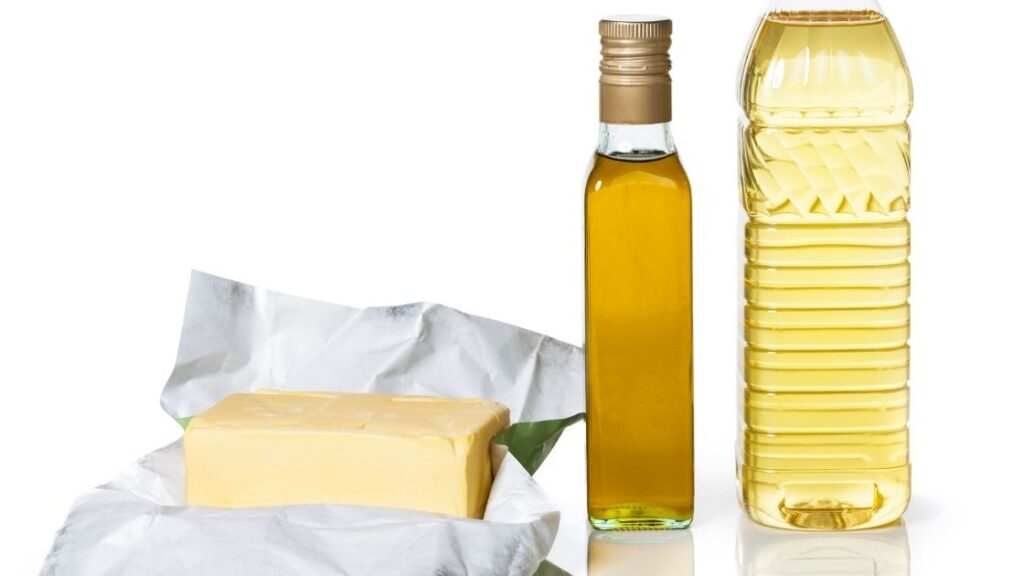
Saturated fat has been linked to many health concerns – including obesity, high blood pressure, and heart disease.
This means that olive oil not only prevents your risk of a bunch of overall health problems but can actively help fight against them in more ways than one.
So what are they?
Olive Oil Benefits
- Keep the Cardiovascular System Healthy
Linoleic acid contained in olive oil can reduce the risk of heart disease.
Studies show that the olive oil diet and other diets high in linoleic and oleic acids were associated with a reduced incidence of cardiovascular disease, particularly among overweight people over 50.
- Prevents Metabolic syndrome
‘Metabolic syndrome’ is a group of interlinked conditions that all increase the likelihood of obesity, heart disease, and stroke.
Preliminary studies have linked the adoption of a Mediterranean diet, including olive oil, to reduced risk of metabolic syndrome and improved metabolism.
This means that adopting olive oil in the kitchen is an effective way to fight against weight gain!
- Reduces the Risk of Cancer
Highly processed oils, including corn, canola, and margarine, have been associated with an increased risk of several types of cancer.
Human studies suggest that replacing these products with olive oil may reduce the risk of all kinds of cancers.
- Balances Blood Sugar and Prevents Diabetes
Consuming olive oil may reduce the risk of type 2 diabetes by lowering glycemic indexes and blood sugar levels.
- Manage Inflammatory Bowel Disease (IBD)
Olive oil is naturally rich in polyphenols, which have numerous health benefits, including the ability to prevent oxidative stress and inflammation and control blood sugar levels.
It is also gentle and may help prevent IBD symptoms.
Using Olive Oil for Weight Loss
Using olive oil regularly can support heart health, keep blood sugar in check, and keep a host of health issues at bay.
Okay, so olive oil is good for you, but can you use olive oil for weight loss, too?
Olive oil still contains high amounts of fat and calories, and we are not recommending you go out and drink a cup if you are looking to lose weight.
However, as we all know by now, there’s more than one type of fat.
As it is plant-based and minimally processed, extra virgin olive oil benefits extend to average weight loss.
Switching to olive oil and a Mediterranean diet will help keep you slim and healthy!

Most health specialists and nutritionists today support using Mediterranean and other plant-based diets and fats for their weight loss properties while recommending you avoid animal fats.
So, in short, yes – switching to olive oil can help you fight against fat!
Conclusion
Supposedly gifted to man by the ancient gods, the health benefits of olive oil have been renowned since ancient times and are now supported by modern research.
From heart disease to inflammation, incorporating olive oil into your daily diet can help you in more ways than one.
You can even use olive oil for weight loss; Ditch the butter and switch to this heaven-sent elixir!
Frequently Asked Questions
Can you consume olive oil throughout the year?
Yes, of course! Most types of olive oil are harvested in the autumn-winter months, but this golden oil can be enjoyed all year long.
How should I store my olive oil?
Once opened, olive oil can lose its flavor and aroma. It’ll also go rancid after about a year, so don’t plan on storing those bottles for too long! For freshness, keep your olive oil in a dark cupboard or out of direct sunlight.
What are the health benefits of olive oil?
There are many benefits of olive oil, including reduced risk of heart disease and cancer, regulating blood sugar, and other anti-inflammatory properties.
Topically, olive oil can even fight against the signs of aging and is used worldwide to keep skin, hair, and nails healthy and strong.
Can olive oil be reused?
Olive oil can be reused; however, it will take on some of the flavors of whatever was cooked in it.
Can I cook with Extra Virgin Olive Oil?
Cooking with extra virgin oil isn’t recommended as the virgin olive oil benefits are lost if heated.
How many calories are there in olive oil?
There are 119 calories in a tablespoon of olive oil.

Rosily Ryan is an accomplished health and fitness writer, editor, and health activist based in Sydney, Australia. With a wealth of knowledge and expertise in the health and nutrition industry, Rosily has established herself as a trusted authority in the field. She has contributed to several leading publications, including Pure Green Magazine, where her work has been widely recognized for its insightful analysis and engaging style.
Rosily’s passion for health and fitness is evident in her writing. Her extensive research and first-hand experience in the field allow her to provide valuable insights and practical advice to her readers. As an advocate for healthy living, Rosily has been actively involved in various health initiatives and campaigns that aim to raise awareness about the importance of physical and mental well-being.
